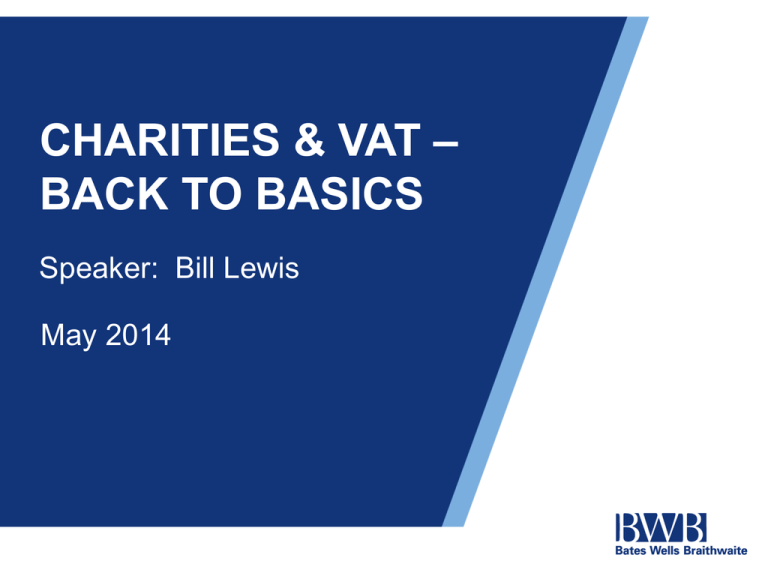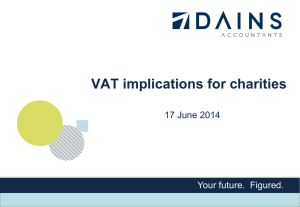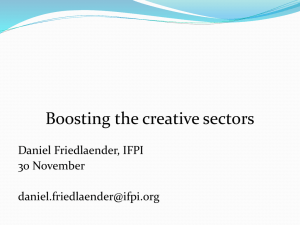I-CharitiesVAT
advertisement

CHARITIES & VAT – BACK TO BASICS Speaker: Bill Lewis May 2014 Today’s Topics • How the VAT System Works • Difference between Standard rated, reduced rated, zero rated and exempt supplies • VAT reliefs of assistance to charities • When to charge VAT on income • Grants v Fees and VAT VAT & Supplies • VAT needs to be taken into account when there is a “supply” of goods or services. • Broadly speaking, a supply takes place when goods/services are provided and consideration of some kind is provided in return. • Consideration is not restricted to cash – can be by barter/trade. Overview of VAT • Supplies of goods and services sold at standard rate of VAT, unless • There is a zero rate of VAT, or • They are sold at reduced rate of 5%, or • They are exempt from VAT Standard Rate supplies include • Merchandise – Christmas cards etc. • Consultancy services • Supplies of staff • Advertising/sponsorship of/by Corporate Supporter Zero rated supplies include • Books and publications • Charity fundraising letters etc. • Goods designed for use by disabled people • Non-interactive Charity advertising • New buildings used for a “relevant charitable” purpose Reduced rate supplies include • Certain construction services • Child car safety seats • Domestic/charity fuel and power • Ladies sanitary products, contraceptives • Welfare advice and information Possibly in future will include labour intensive services? Exempt supplies include • Education • Welfare services • Raffles • One Off Fundraising Events • Property Rental • Charity Membership subscriptions Gifts/donations • Outside the scope of VAT – no supply Recovering/paying VAT Background to VAT returns • No VAT recovery on costs connected to exempt/outside the scope of VAT income • Full VAT recovery on costs connected to standard, reduced, and zero rated VAT income • Partial VAT recovery on central overhead costs TAX and Contracts With Corporate Sponsors • Donations – tax and VAT free • If sponsor simply asks for acknowledgement – no VAT • If sponsor requires use of their name & logo – ensure 10% of sponsorship is run through the trading company and VAT is charged. • If sponsor requires anything else – seek advice VAT & Direct Mailing • VAT zero rate for printing of books, pamphlets, newsletters, leaflets • Mixed leaflet/form – 25% test • VAT zero rate for charity mail shots for fundraising • Zero rate does not apply to stationery, posters, stickers etc. VAT & Direct Mailing – fundraising mail shots • Zero rate applies to letter, pre printed envelope & return envelope for donation • PROVIDED they are all overprinted with details of the appeal VAT & Direct Mailing – Packages • When packages contain zero rate and standard rate packaged items, zero rate turns on whether the majority of items are zero rated. • Majority can be by number, or by importance of individual elements. VAT & Direct Mailing – production costs • Separate supplies by designers and mailing houses of packages are subject to VAT, while only printing costs are zero rated. • Supplies by “one stop shops” who design & print & mail are subject to the zero rate of VAT. VAT & Direct Mailing • Detailed information – VAT Notice 701/10 – “Zero Rating of Books etc” • From www.hmrc.gov.uk Fundraising Events 1. Event organised and promoted exclusively for charity by charity or wholly owned trading subsidiary 2. No more than 15 events of the same type in the same location within any one financial year – disregarding events where gross income is £1,000 or less in a week. 3. Event cannot include more than 2 nights accommodation Fundraising Exemption 1. Examples: film, sporting participation (including spectators), dinner, concert, dance, games of skill, fireworks displays, jumble sales 2. Not street or house to house collections 3. What constitutes a location Exemption Covers 1. Admission charges 2. Brochures 3. Sale of advertising space 4. Other items sold at the event (unless zero rated) 5. Sponsorship payments 6. Raffles (NB auctions are zero rated) Does not cover sponsorship payments of event participants! Grant v Fee • Grants freely given, no or limited benefit to the payer, outside scope of VAT • Fees mean benefit to the payer, subject to VAT unless covered by an exemption. • Cases: Hillingdon Legal Resource Centre, Wolverhamption CAB, Mohr • Consider splits between fees and grants when minor benefits to the payer. • Cicero: “Cui Bono?” Who Benefits? Good question to ask in grant v fee debate Grant v Fee – other considerations • Carrying out stautory work is not usually grant funded. • Having to tell the payer how the money was spent is only good housekeeping • Don’t rely on government departments applying the correct VAT treatment – they often refer to payments as grants which are really fees. • HMRC will still see it as a “result” charging VAT on government money even though there is no overall benefit to the exchequer. • Try and have funding as plus “VAT if applicable” Any Questions?



